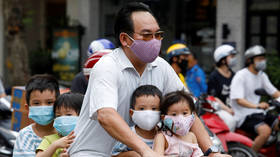- Joined
- Jul 10, 2008
- Messages
- 66,309
- Points
- 113
Lockdowns and school closures may be killing MORE children than Covid-19, warn leading UN officials citing new study
29 Jul, 2020 01:06 / Updated 3 months ago
Get short URL

A man and his children, all wearing protective masks, ride a bicycle on a street during the coronavirus disease (COVID-19) outbreak, in Hanoi, Vietnam July 27, 2020. © REUTERS/Kham
Advocates of reopening schools may have found a surprise ally in leaders of UN agencies – including the WHO – who cited a new study to show children may suffer more harm from lockdowns than the actual pandemic.
“The repercussions of the pandemic are causing more harm to children than the disease itself,” UNICEF director Henrietta H Fore said on Monday, seeking more funding to deal with the crisis. The agency’s nutrition program chief Victor Aguayo added that harm is caused “by having schools closed, by having primary health care services disrupted, by having nutritional programs dysfunctional.”
Fore joined World Health Organization director Tedros Adhanom Ghebreyesus, UN Food and Agriculture Organization (FAO) chief Qu Dongyu, and World Food Programme director David M Beasley in signing a call to action published in the Lancet, citing Covid-19 response strategies such as “physical distancing, school closures, trade restrictions, and country lockdowns” as contributing to child malnutrition globally.
This could increase the number of children affected by acute malnutrition by an additional 6.7 million, on top of the 47 million the UN estimated were affected by “wasting” prior to the pandemic. It could also cause more than 10,000 additional deaths each month – or 128,000 over the span of the next 12 months, the four officials said.
These estimates are based on a study by researchers from several scientific establishments, including the Washington-based International Food Policy Research Institute (IFPRI) and the Johns Hopkins Bloomberg School of Public Health, published by the Lancet this week.
After analyzing more than 118 low- and middle-income countries, the researchers warned that disruptions from Covid-19 response could endanger millions of families. Four out of five people affected live across South Asia and sub-Saharan Africa, with children up to five years old most at risk.
The lockdowns and other pandemic mitigation measures could result in “life-long impacts on education, chronic disease risks, and overall human capital formation,” as well as “intergenerational consequences for child growth and development.”
29 Jul, 2020 01:06 / Updated 3 months ago
Get short URL
A man and his children, all wearing protective masks, ride a bicycle on a street during the coronavirus disease (COVID-19) outbreak, in Hanoi, Vietnam July 27, 2020. © REUTERS/Kham
Advocates of reopening schools may have found a surprise ally in leaders of UN agencies – including the WHO – who cited a new study to show children may suffer more harm from lockdowns than the actual pandemic.
“The repercussions of the pandemic are causing more harm to children than the disease itself,” UNICEF director Henrietta H Fore said on Monday, seeking more funding to deal with the crisis. The agency’s nutrition program chief Victor Aguayo added that harm is caused “by having schools closed, by having primary health care services disrupted, by having nutritional programs dysfunctional.”
Fore joined World Health Organization director Tedros Adhanom Ghebreyesus, UN Food and Agriculture Organization (FAO) chief Qu Dongyu, and World Food Programme director David M Beasley in signing a call to action published in the Lancet, citing Covid-19 response strategies such as “physical distancing, school closures, trade restrictions, and country lockdowns” as contributing to child malnutrition globally.
This could increase the number of children affected by acute malnutrition by an additional 6.7 million, on top of the 47 million the UN estimated were affected by “wasting” prior to the pandemic. It could also cause more than 10,000 additional deaths each month – or 128,000 over the span of the next 12 months, the four officials said.
These estimates are based on a study by researchers from several scientific establishments, including the Washington-based International Food Policy Research Institute (IFPRI) and the Johns Hopkins Bloomberg School of Public Health, published by the Lancet this week.
After analyzing more than 118 low- and middle-income countries, the researchers warned that disruptions from Covid-19 response could endanger millions of families. Four out of five people affected live across South Asia and sub-Saharan Africa, with children up to five years old most at risk.
The lockdowns and other pandemic mitigation measures could result in “life-long impacts on education, chronic disease risks, and overall human capital formation,” as well as “intergenerational consequences for child growth and development.”















